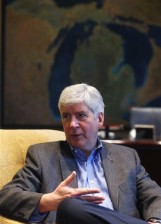
Michigan Gov. Rick Snyder says he’s giving close scrutiny to gun legislation that would allow concealed weapons in churches and schools. AP
HARROLD, Texas — In the tiny Texas town of Harrold, children and their parents don’t give much thought to safety at the community’s lone school — mostly because some of the teachers are carrying concealed weapons.
The nearest sheriff’s office is 30 minutes away, and people tend to know — and trust — one another. So the school board voted to let teachers bring guns to school.
“We don’t have money for a security guard, but this is a better solution,” Superintendent David Thweatt said. “A shooter could take out a guard or officer with a visible, holstered weapon, but our teachers have master’s degrees, are older and have had extensive training. And their guns are hidden. We can protect our children.”
In the awful aftermath of last week’s Connecticut elementary school shooting, lawmakers in a growing number of states — including Oklahoma, Missouri, Minnesota, South Dakota and Oregon — have said they will consider laws allowing teachers and school administrators to carry firearms at school.
Texas law bans guns in schools unless the school has given written authorization. Arizona and six other states have similar laws with exceptions for people who have licenses to carry concealed weapons.
Harrold’s school board voted unanimously in 2007 to allow employees to carry weapons. After obtaining a state concealed-weapons permit, each employee who wants to carry a weapon must be approved by the board based on his or her personality and reaction to a crisis, Thweatt said.
Employees also must undergo training in crisis intervention and hostage situations. And they must use bullets that minimize the risk of ricochet, similar to those carried by air marshals on planes.
CaRae Reinisch, who lives in the nearby community of Elliott, said she took her children out of a larger school and enrolled them in Harrold two years ago, partly because she felt they would be safer in a building with armed teachers.
“I think it’s a great idea for trained teachers to carry weapons,” Reinish said. “But I hate that it has come to this.”
The superintendent won’t disclose how many of the school’s 50 employees carry weapons, saying that revealing that number might jeopardize school security.
The school has 103 students from kindergarten through 12th grade. Most of them rarely think about who is carrying a gun.
“This is the first time in a long time that I’ve thought about it,” said Matt Templeton, the principal’s 17-year-old son. “And that’s because of what happened” in Connecticut.
Opponents insist that having more people armed at a school, especially teachers or administrators who aren’t trained to deal with crime on a daily basis, could lead to more injuries and deaths. They point to an August shooting outside the Empire State Building, where police killed a laid-off clothing designer after he fatally shot his former colleague. Nine bystanders were wounded by police gunfire, ricochets and fragments.
“You are going to put teachers, people teaching 6-year-olds in a school, and expect them to respond to an active-shooter situation?” said Ladd Everitt, a spokesman for the Washington, D.C.-based Coalition to Stop Gun Violence, who called the idea of arming teachers “madness.”
Dan Gross, president of the Brady Campaign, said focusing on arming teachers distracts from the “real things” that could help prevent a school shooting “and at worse it furthers a dangerous conversation that only talks about guns as protection without a discussion about the serious risks they present.”
As the debate continues, Harrold’s school plans to leave its policy unchanged.
“Nothing is 100 percent at all. … But hope makes for a terrible plan, hoping that (a tragedy) won’t happen,” Thweatt said. “My question is: What have you done about it? How have you planned?”